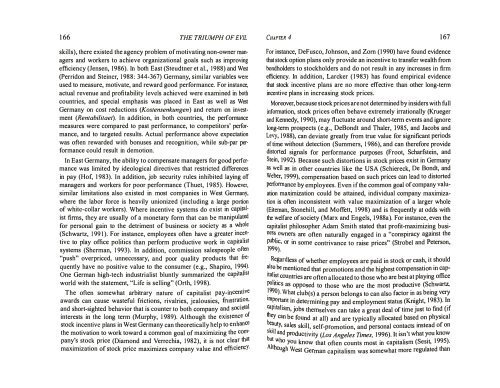austin-murphy-the-triumph-of-evil
austin-murphy-the-triumph-of-evil
austin-murphy-the-triumph-of-evil
Create successful ePaper yourself
Turn your PDF publications into a flip-book with our unique Google optimized e-Paper software.
166 THE TRIUMPH OF EVIL<br />
skills), <strong>the</strong>re existed <strong>the</strong> agency problem <strong>of</strong> motivating non-owner managers<br />
and workers to achieve organizational goals such as improving<br />
efficiency (Jensen, 1986). In both East (Steudtner et al., 1988) and West<br />
(Perridon and Steiner, 1988: 344-367) Germany, similar variables were<br />
used to measure, motivate, and reward good performance. For instance,<br />
actual revenue and pr<strong>of</strong>itability levels achieved were examined in both<br />
countries, and special emphasis was placed in East as well as West<br />
Germany on cost reductions (Kostensenkungen) and return on investment<br />
(Rentabilitaet). In addition, in both countries, <strong>the</strong> performance<br />
measures were compared to past performance, to competitors' performance,<br />
and to targeted results. Actual performance above expectation<br />
was <strong>of</strong>ten rewarded with bonuses and recognition, while sub-par performance<br />
could result in demotion.<br />
In East Germany, <strong>the</strong> ability to compensate managers for good performance<br />
was limited by ideological directives that restricted differences<br />
in pay (H<strong>of</strong>, 1983). In addition, job security rules inhibited laying <strong>of</strong>f<br />
managers and workers fo r poor performance (Thuet, 1985). However,<br />
similar limitations also existed in most companies in West Germany,<br />
where <strong>the</strong> labor force is heavily unionized (including a large portion<br />
<strong>of</strong> white-collar workers). Where incentive systems do exist in capitalist<br />
firms, <strong>the</strong>y are usually <strong>of</strong> a monetary form that can be manipulated<br />
for personal gain to <strong>the</strong> detriment <strong>of</strong> business or society as a whole<br />
(Schwartz, 1991). For instance, employees <strong>of</strong>ten have a greater incentive<br />
to play <strong>of</strong>fice politics than perform productive work in capitalist<br />
systems (Sherman, 1993). In addition, commission salespeople <strong>of</strong>ten<br />
"push" overpriced, unnecessary, and poor quality products that frequently<br />
have no positive value to <strong>the</strong> consumer (e.g., Shapiro, 1994).<br />
One German high-tech industrialist bluntly summarized <strong>the</strong> capitalist<br />
world with <strong>the</strong> statement, "Life is selling" (Orth, 1998).<br />
The <strong>of</strong>ten somewhat arbitrary nature <strong>of</strong> capitalist pay-incentive<br />
awards can cause wasteful frictions, rivalries, jealousies, frustration,<br />
and short-sighted behavior that is counter to both company and societal<br />
interests in <strong>the</strong> long term (Murphy, 1989). Although <strong>the</strong> existence <strong>of</strong><br />
stock incentive plans in West Germany can <strong>the</strong>oretically help to enhance<br />
<strong>the</strong> motivation to work toward a common goal <strong>of</strong> maximizing <strong>the</strong> company's<br />
stock price (Diamond and Verrechia, 1982), it is not clear that<br />
maximization <strong>of</strong> stock price maximizes company value and efficiency.<br />
CHAPTER 4 167<br />
For instance, DeFusco, Johnson, and Zorn ( 1990) have found evidence<br />
that stock option plans only provide an incentive to transfer wealth from<br />
bondholders to stockholders and do not result in any increases in firm<br />
efficiency. In addition, Larcker (1983) has found empirical evidence<br />
that stock incentive plans are no more effective than o<strong>the</strong>r long-term<br />
incentive plans in increasing stock prices.<br />
Moreover, because stock prices are not determined by insiders with full<br />
information, stock prices <strong>of</strong>ten behave extremely irrationally (Krueger<br />
and Kennedy, 1990), may fluctuate around short-term events and ignore<br />
long-term prospects (e.g., DeBondt and Thaler, 1985, and Jacobs and<br />
Levy, 1988), can deviate greatly from true value for significant periods<br />
<strong>of</strong> time without detection (Summers, 1986), and can <strong>the</strong>refore provide<br />
distorted signals for performance purposes (Froot, Scharfstein, and<br />
Stein, 1992). Because such distortions in stock prices exist in Germany<br />
as well as in o<strong>the</strong>r countries like <strong>the</strong> USA (Schiereck, De Bondt, and<br />
Weber, 1999), compensation based on such prices can lead to distorted<br />
performance by employees. Even if<strong>the</strong> common goal <strong>of</strong> company valu<br />
ation maximization could be attained, individual company maximization<br />
is <strong>of</strong>ten inconsistent with value maximization <strong>of</strong> a larger whole<br />
(Eiteman, Stonehill, and M<strong>of</strong>fett, 1998) and is frequently at odds with<br />
<strong>the</strong> welfare <strong>of</strong> society (Marx and Engels, 1988a ). For instance, even <strong>the</strong><br />
capitalist philosopher Adam Smith stated that pr<strong>of</strong>it-maximizing busi<br />
ness owners are <strong>of</strong>ten naturally engaged in a "conspiracy against <strong>the</strong><br />
public, or in some contrivance to raise prices" (Strobel and Peterson,<br />
1999).<br />
Regardless <strong>of</strong> whe<strong>the</strong>r employees are paid in stock or cash, it should<br />
�Is� be mentioned that promotions and <strong>the</strong> highest compensation in cap<br />
Itahst countries are <strong>of</strong>ten allocated to those who are best at playing <strong>of</strong>fice<br />
politics as opposed to those who are <strong>the</strong> most productive (Schwartz,<br />
�990). What club(s) a person belongs to can also factor in as being very<br />
: ��nt in determining pay and employment status (Knight, 1983). �<br />
P llahsm, jobs <strong>the</strong>mselves can take a great deal <strong>of</strong> time just to find (lf<br />
<strong>the</strong>y can be found at all) and are typically allocated based on physical<br />
�kill and productivity (Los Angeles Times, 1996). 1t isn't what you know<br />
�uty, sales skill, self-promotion, and personal contacts instead <strong>of</strong> on<br />
ut who you know that <strong>of</strong>ten counts most in capitalism (Sesit, 1995).<br />
Although West German capitalism was somewhat more regulated than


